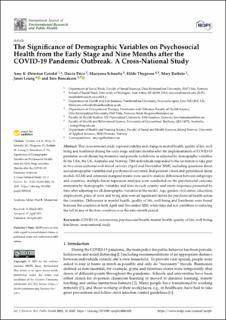| dc.contributor.author | Geirdal, Amy Østertun | |
| dc.contributor.author | Price, Daicia | |
| dc.contributor.author | Schoultz, Mariyana | |
| dc.contributor.author | Thygesen, Hilde | |
| dc.contributor.author | Ruffolo, Mary | |
| dc.contributor.author | Leung, Janni | |
| dc.contributor.author | Bonsaksen, Tore | |
| dc.date.accessioned | 2021-06-09T13:36:41Z | |
| dc.date.available | 2021-06-09T13:36:41Z | |
| dc.date.created | 2021-04-20T10:14:46Z | |
| dc.date.issued | 2021-04-20 | |
| dc.identifier.citation | International Journal of Environmental Research and Public Health. 2020, 18 (8), 1-18). | en_US |
| dc.identifier.issn | 1661-7827 | |
| dc.identifier.uri | https://hdl.handle.net/11250/2758723 | |
| dc.description.abstract | This cross-national study explored stability and change in mental health, quality of life, well- being and loneliness during the early stage and nine months after the implementation of COVID-19 pandemic social distancing measures and periodic lockdowns as adjusted by demographic variables. In the USA, the UK, Australia and Norway, 7284 individuals responded to the invitation to take part in two cross-sectional web-based surveys (April and November 2020), including questions about sociodemographic variables and psychosocial outcomes. Independent t-tests and generalized linear models (GLM) and estimated marginal means were used to analyze differences between subgroups and countries, multiple linear regression analyses were conducted on the psychosocial outcome measures by demographic variables and time in each country and mean responses presented by time after adjusting for all demographic variables in the model. Age, gender, civil status, education, employment, place of work and living area were all significant factors for psychosocial health across the countries. Differences in mental health, quality of life, well-being and loneliness were found between the countries in both April and November 2020, while time did not contribute to reducing the toll in any of the four countries over the nine-month period. | en_US |
| dc.language.iso | eng | en_US |
| dc.publisher | MDPI | en_US |
| dc.relation.ispartofseries | International Journal of Environmental Research and Public Health;volume 18, issue 8 | |
| dc.rights | Navngivelse 4.0 Internasjonal | * |
| dc.rights.uri | http://creativecommons.org/licenses/by/4.0/deed.no | * |
| dc.subject | COVID-19 | en_US |
| dc.subject | Coronavirus | en_US |
| dc.subject | Psychosocial health | en_US |
| dc.subject | Mental health | en_US |
| dc.subject | Life qualities | en_US |
| dc.subject | Well-being | en_US |
| dc.subject | Loneliness | en_US |
| dc.title | The Significance of Demographic Variables on Psychosocial Health from the Early Stage and Nine Months after the COVID-19 Pandemic Outbreak. A Cross-National Study | en_US |
| dc.type | Peer reviewed | en_US |
| dc.type | Journal article | en_US |
| dc.description.version | publishedVersion | en_US |
| dc.rights.holder | © 2021 by the authors. | en_US |
| dc.source.articlenumber | 4345 | en_US |
| cristin.ispublished | true | |
| cristin.fulltext | original | |
| cristin.qualitycode | 1 | |
| dc.identifier.doi | https://doi.org/10.3390/ijerph18084345 | |
| dc.identifier.cristin | 1905223 | |
| dc.source.journal | International Journal of Environmental Research and Public Health | en_US |
| dc.source.volume | 18 | en_US |
| dc.source.issue | 8 | en_US |
| dc.source.pagenumber | 18 | en_US |

